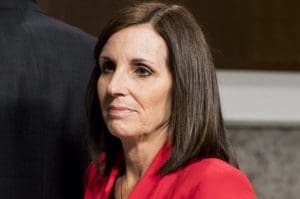GOP senator criticizes colleagues over stock scandal but keeps their donations
Sen. Martha McSally accepted more than $40,000 in campaign donations from senators embroiled in a scandal.

Sen. Martha McSally (R-AZ) has accepted more than $40,000 in campaign donations from individuals embroiled in an insider trading scandal.
After receiving a private congressional briefing about the coronavirus crisis on Jan. 24, several Republican senators made questionable stock trades, resulting in allegations that they profited from insider knowledge.
Sens. Kelly Loeffler and David Perdue of Georgia, and Sen. Richard Burr of North Carolina have all fallen under a cloud of suspicion. All three maintain they are innocent of any wrongdoing.
Between 2014 and 2019, McSally received $40,834 in campaign contributions from Loeffler, her husband, Jeff Sprecher, chairman of the New York Stock Exchange (who is also implicated in the scandal), and PACs run by Perdue and Burr, according to Federal Election Commission reporting.
McSally received $17,500 from Burr’s leadership PAC (including $10,000 in 2019), $20,000 from Perdue’s leadership PAC (including $10,000 in 2019), $1,667 from Loeffler, and $1,667 from Sprecher.
The McSally campaign did not respond to a request for comment.
McSally has thus far refused to return the contributions despite speaking critically of her colleagues’ alleged behavior.
“If it is proven that they’ve done something illegal or unethical, they will have to be significantly punished,” White House economic adviser Larry Kudlow said during an April 8 tele-town hall hosted by McSally.
“Larry, I couldn’t agree with you more,” McSally said. “If these allegations are true, they need to be held accountable.”
“Senator McSally should put party politics aside, and demand full investigations into her colleagues and campaign donors’ reported actions,” Brad Bainum, Arizona Democratic Party spokesperson, said in a Wednesday email.
“Martha McSally is funding her campaign with contributions from the same corrupt Republican Senators she’s now criticizing,” Zach Hudson, a spokesperson with American Bridge, said in an April 9 statement. If she refuses to return the money, her criticism is just “empty talk from a senator who is about to lose her second Senate race in two years,” Hudson added.
McSally lost her 2018 Senate race to Democrat Kyrsten Sinema, and was later appointed to her position by the state’s Republican governor to fill out the remainder of the late Sen. John McCain’s term.
In her 2020 race against Democratic candidate and former astronaut Mark Kelly, McSally has already faced campaign finance scandals.
In June 2019, McSally was fined $23,000 for accepting $319,000 in excessive contributions from 117 people during her 2014 House race.
In March 2019, she was forced to pay a $5,000 fine for failing to properly report $54,300 in campaign contributions near the end of her 2014 campaign.
Her struggles with campaign funding go further than campaign finance violations.
In December 2019, McSally was caught asking outside conservative groups to spend money on supportive television ads because her campaign did not have the funds to do so.
“If I went up on TV right now, my campaign coffers would be empty,” she told a group of Republicans. “We need conservative outside groups, you know, to wake up, and get involved, and start muddying up the landscape a little bit.”
McSally has also accepted thousands of dollars in campaign donations from Hunt Corporation, which she accused of being “slumlords” during a congressional hearing.
On Monday, Kelly announced that he raised $11 million in the first three months of the year, and had nearly $20 million in his campaign account.
McSally was only able to raise $6.3 million in the first quarter of the year, and reported just over $10 million in her campaign account.
A poll released on Wednesday showed McSally trailing Kelly by a 51-42 margin.
Published with permission of The American Independent Foundation.
Recommended

Biden campaign launches new ad focused on Affordable Care Act
Former President Trump has said he wants to do away with the popular health care law.
By Kim Lyons, Pennsylvania Capital-Star - May 08, 2024
Ohio doctors fear effects of emergency abortion care case set to go before U.S. Supreme Court
A federal law that allows emergency departments to treat patients without regard to their ability to pay will be under U.S. Supreme Court scrutiny this week, and Ohio doctors are concerned about the case’s local impact on emergency abortion care.
By Susan Tebben, Ohio Capital Journal - April 23, 2024
House GOP votes to end flu, whooping cough vaccine rules for foster and adoptive families
A bill to eliminate flu and whooping cough vaccine requirements for adoptive and foster families caring for babies and medically fragile kids is heading to the governor’s desk.
By Anita Wadhwani, Tennessee Lookout - March 26, 2024









































































